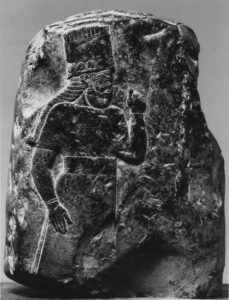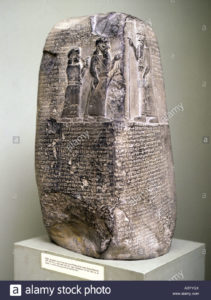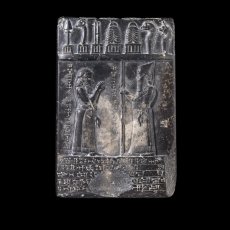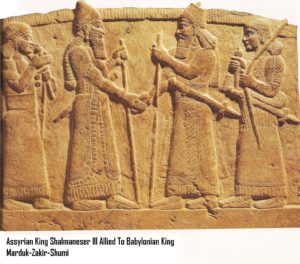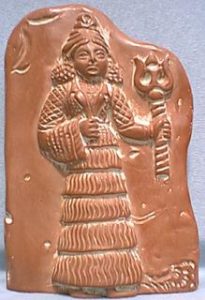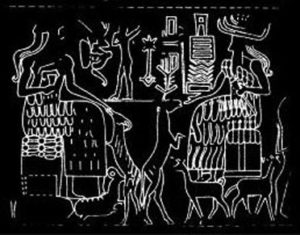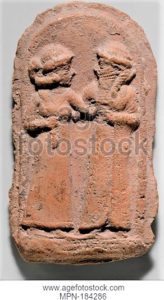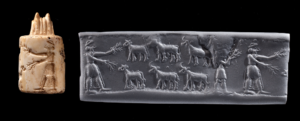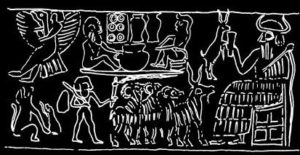http://mcadams.posc.mu.edu/txt/ah/assyria/inscra02.html
(Texts: All Artifacts, Color Coding, & Writings in Bold Type With Italics Inside Parenthesis, are Added by Editor R. Brown, not the Authors, Translators, or Publishers!)
(gods in blue …mixed-breed demigods in teal…)
COLUMN I
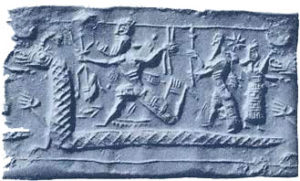 (Marduk, son Ashur, & Inanna, Ningishzidda’s dragon snake symbol)
(Marduk, son Ashur, & Inanna, Ningishzidda’s dragon snake symbol)
1. To Uras (Marduk), the strong, the almighty, the supreme, the firstborn of the gods, the lusty warrior, the unique one, whose onset in battle is unrivaled, the
2. eldest son, the crusher of opposition, the firstborn of Ea (Enki), the powerful warrior of the angels (Igigi) (those in orbit who transport from Earth to Nibiru), the counselor of the gods, the offspring of the temple of the earth, 1 the binder of the bonds
3. of heaven and earth, the opener of fountains, who treads down the wide-spreading earth, the god without whom the laws of heaven and earth are unmade,
4. the strong champion (?) who changes not the command of his mouth, the firstborn of the zones, the giver of the scepter and law to all cities, the forceful
5. minister, the utterance of whose lips alters not, in power far-reaching, the augur of the gods, the exalted one, the meridian Sun-god, the lord of lords, who the extremities of heaven
6. (and) earth superintends with his hand, the king of battle, the illustrious one who overcomes opposition, the sovereign, the unique one, the lord of fountains and seas,
7. the strong, the unsparing, whose onset is the deluge that sweeps away the land of the enemy, the slayer of the wicked, the lusty god whose counsel is unchanging,
8. the light of heaven (and) earth, the illuminator of the recesses of the deep, the destroyer of the evil, the subduer of the disobedient, the uprooter of the hostile, whose name in the assembly of the gods
9. no god has changed, the giver of life, the god of mercy to whom prayer is good, who dwells in Calah, 1 the great lord, my lord; [I] Assur-natsir-pal the powerful king,
10. the king of hosts, the king unrivaled, the king of all the four regions (of the world), the Sun-god of multitudes of men, the favorite of Bel (Enlil) 2 and Uras (Nammu), the beloved of Anu
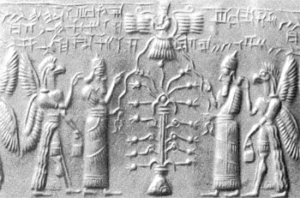 (Apkulla pilot, Enki, Anu in winged sky-disc, Enlil, & Apkulla pilot)
(Apkulla pilot, Enki, Anu in winged sky-disc, Enlil, & Apkulla pilot)
11. and Dagon (Enki), 3 the hero of the great gods who bows himself (in prayer), the beloved of thy heart, the prince, the favorite of Bel whose high-priesthood
12. has seemed good to thy great divinity so that thou hast established his reign, the
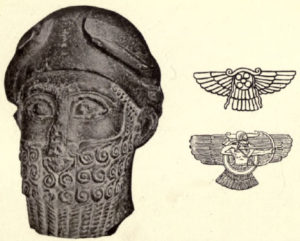 (Ashur, loyal warrior son to Marduk)
(Ashur, loyal warrior son to Marduk)
13. warrior hero who has marched in the service of Assur (Osiris) his lord, and among the princes
13. of the four regions (of the world) has no rival, the shepherd of fair shows who fears not opposition, the unique one, 4 the mighty, who has not
14. an opponent, the king who subdues the unsubmissive, who has overcome all the multitudes of men, the powerful hero, who treads
15. upon the neck of his enemies, who tramples upon all that is hostile, who breaks in pieces the squadrons of the mighty, who in reliance on the great gods, his lords,
16. has marched, and whose hand has conquered all lands, has overcome the mountains to their furthest bounds, and has received their tribute, who has taken
17. hostages, who has established empire over all lands. At that time Assur the lord, the proclaimer of my name, the enlarger of my kingdom,
18. entrusted his weapon (alien technology) that spares not to the hands of my lordship, (even to me) Assur-natsir-pal the exalted prince, the adorer of the great
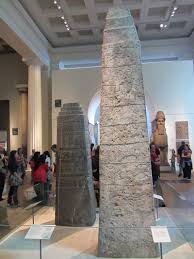 (White Obelisk of giant Assyrian King Ashurnatsirpal I)
(White Obelisk of giant Assyrian King Ashurnatsirpal I)
19. gods, the mighty monster, 1 the conqueror of cities and mountains to their furthest bounds, the king of lords, the consumer of the violent, who is crowned with
20. terror, who fears not opposition, the valiant one, the supreme judge who spares not, who overthrows resistance, the king of all princes,
21. the lord of lords, the shepherd-prince, the king of kings, the exalted prophet, named by Uras (Marduk) the warrior-god (and) hero of the great gods, the avenger of his fathers,
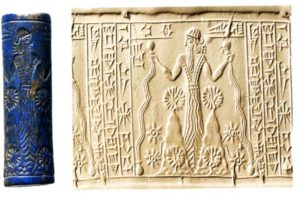
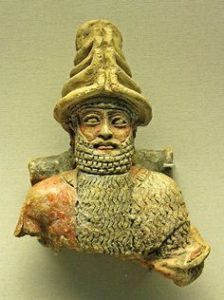
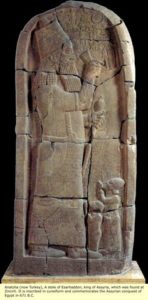 (Marduk, Utu, & Ashur)
(Marduk, Utu, & Ashur)
22. the king who has marched with justice in reliance on Assur and Samas (Utu /Shamash), 2 the gods his helpers, and powerful countries and princes his foemen
23. he has cast down like a reed (and) has subjugated all their lands under his feet, the supplier of the freewill offerings for the great
24. gods, the established prince, who is provident to direct the laws of the temples of his country, the work of whose hands and
25. the gift of whose sacrifices the great gods of heaven and earth desire and have established his high-priesthood in the temples for ever;
26. their strong weapons have they given for the spoil of my lordship; the terror of his weapon, the glory of his lordship, over the kings
27. of the four regions (of the world) have they made strong for him; the enemies of Assur to their furthest bounds above and below he has combated, and tribute and gifts
28. he has laid upon them; (he), the conqueror of the foes of Assur, the powerful king, the king of Assyria, the son of Tiglath-Uras, the high priest of Assur, who upon all his foemen
29. has laid the yoke, has set up the bodies of his adversaries upon stakes; the grandson of Rimmon-nirari the high-priest of the great gods,
30. who brought about the overthrow of those who would not obey him, and overcame the world; the great-grandson of Assur-dân, who
31. founded fortresses (and) established shrines: 1 in those days from the mouth of Assur (and) the great gods kingdom, sovereignty (and) majesty issued forth.
32. I am king, I am sovereign, I am exalted, I am strong, I am glorious, I am lusty, I am the firstborn, I am the champion, I am the warrior,
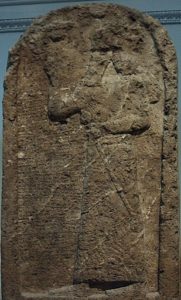 (giant King Ashurnatsirpal I stele)
(giant King Ashurnatsirpal I stele)
- I am a lion, I am a hero; Assur-natsir-pal, the powerful king, the king of Assyria, named of the Moon God, the favorite of Anu, the beloved of Rimmon (Adad) mightiest among the gods,
34. (am) I; a weapon that spares not, which brings slaughter to the land of his enemies, (am) I; a king valiant in battle, the destroyer of cities and mountains,
35. the leader of the conflict, the king of the four regions (of the world), who lays the yoke upon his foes, who enslaves (?) all his enemies, the king of all the zones of all princes,
36. every one of them, the king who subjugates the un-submissive to him, who has overcome all the multitudes of men. This is the destiny which from the mouth of the great gods
37. has issued forth for me, and they have established (it) firmly as my destiny. According to the desire of my heart and the stretching forth of my hand Istar (Inanna), 1 the lady who loves
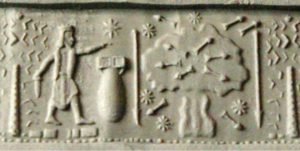 (Inanna, Goddess of Love & War)
(Inanna, Goddess of Love & War)
38. my high-priesthood, looked with favor upon me and set her heart to make combat and battle, and in those days Assur-natsir-pal, the exalted prince, the worshipper of the great gods,
39. whom Bel has caused to obtain the desire of his heart so that his hand conquered the lands of all princes who submitted not unto him, the conqueror
40. of his foes who in difficult places has broken through the squadrons of the mighty —at that time Assur my great lord, the proclaimer of my name,
41. the enlarger of my kingdom over the kings of the four regions (of the world), has mightily magnified my name, the weapon that spares not (alien technology) unto the hands of my lordship
42. he has given to hold. To effect the submission and homage of countries and mighty mountains powerfully has he urged me. In reliance on Assur my lord
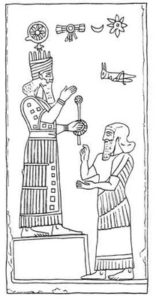 (lord Ashur & his devoted mixed-breed Assyrian King)
(lord Ashur & his devoted mixed-breed Assyrian King)
43. I traversed impassable paths (and) trackless mountains with the forces of my armies: a rival unto me existed not. At the beginning of my reign,
44. in my first year, when the Sun-god the judge of the zones (of the world) had thrown his kindly shadow over me, on the throne of royalty mightily I had sat, (and) the scepter
45. that shepherds mankind he had caused my hand to hold, I collected my chariots (and) armies. Impassable roads (and) trackless mountains, which for the passage
46. of chariots and armies were not suited, I traversed; against the land of Nimme 2 I marched: Libê 3 their strong city (and the cities of) Surra, Apuqu,
47. Arura (and) Arubê, which are in sight of the mountains of Urini, Aruni (and) Etini, 1 strong cities, I captured; their fighting-men
48. in numbers I slew; their spoil, their goods (and) their oxen I carried away. (Their) soldiers sought the inaccessible mountain. The inaccessible mountain they reached. With (my) forces after them
49. I marched. 2 The summit of the mountain was like the point of an iron blade, and the flying bird of heaven had not swooped upon it. Like a nest
50. of hawks (?) in the midst of the mountain they made their stronghold. Into the midst of them where none among the kings my fathers had penetrated, in three days
51. the hero beheld the mountain; against it did his heart offer opposition: he ascended the mountain on his feet; he overthrew (and) destroyed their nest; their forces
52. he shattered; 200 of their warriors he slew with weapons. Their spoil, multitudinous as a flock of sheep, I carried away.
53. With their blood I dyed the mountain like wool (?). The ravine (and) torrent of the mountain devoured 3 what was left of them. Their cities
54. I overthrew, dug up (and) burned with fire. From the country of Nimme I departed; into the country of Kirruri 4 I descended, the tribute of the countries of Kirruri
55. ’Sime’si, 5 (and) ’Simera, the city of Ulmania, (and)the countries of Adaus, 1 of the Murgians, (and) of the Murmia’sians, 2 horses, mules, 3
56. oxen, sheep, wine, (and) a bowl of copper, as their tribute I received. I established a governor over them. When in Kirruri
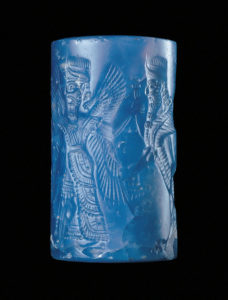
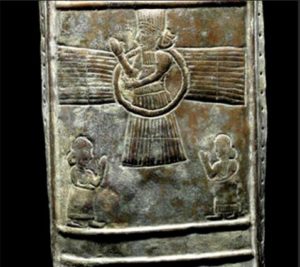 (overwhelming winged sky-disc pilot Ashur)
(overwhelming winged sky-disc pilot Ashur)
57. I was slaying, the glory of Assur my lord overwhelmed the people of Gozan and Khupuska: 4 horses, silver,
58. gold, lead, copper (and) a bowl of copper as their tribute they brought before me. From Kirruri I departed,
59. into the lowlands of the city of Khulun, into the country of Qurkhi 5 of Betani I descended. The cities of Khatu, 6 Khataru, Nistun, Irbidi,
60. Mitqia, Arzania, 7 Tela, 8 (and) Khalua, the cities of Qurkhi which in sight of the mountains of U’su, Arua
61. (and) Arardhi, 9 mighty mountains, are situated, I captured; their soldiers in multitudes I slew; their spoil (and) their goods I carried away.
62. [Their] soldiers sought the peak (of the mountain); they reached the summit which (is) at the entrance to the city of Nistun, which hangs from the sky like a cloud. Into the midst of them, where none among the kings my fathers had penetrated, my warriors flew upon them like birds:
64. 260 of their fighting-men I slew with weapons; their heads I cut off (and) built into a pyramid. The rest of them like a bird
65. made (their) nest in the rocks of the mountain. Their spoil (and) their goods from the midst of the mountain I brought down. The cities which in the midst
66. of the mighty ranges were situated I overthrew, I dug up, I burned with fire. All the soldiers who had fled from the face of my weapons descended; my feet
67. they embraced. Tribute, gifts, and a satrap I imposed upon them. Bubu the son of Bubâ, 1 the son of the chief of the city of Nistun,
68. I flayed in the city of Arbela (and) clothed the wall of the fortress with his skin. At that time I made an image of my person; the glorious deeds of my abundant power
69. I inscribed upon (it). I erected (it) in the mountains of the land of Eqi in the city of Assur-natsir-pal at the head of the river-source. 2 In the year when I was eponym 3 on the 24th day of the month Ab, 4
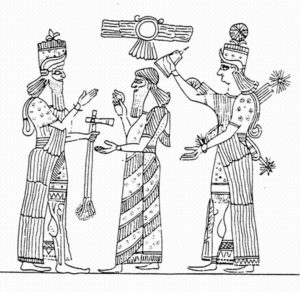 (Ashur & Assyrian king being crowned by Inanna)
(Ashur & Assyrian king being crowned by Inanna)
70. by the command of Assur (and) Istar (Inanna) the great gods my lords I departed from the city of Ninevah; against the cities which at the foot of the mountains of Nibur and Pazate, mighty mountains,
71. are situated I marched; I conquered the cities of Atkun, Uskhu, Pilazi (and) 20 (other) cities dependent on them. Their numerous fighting-men I slew;
72. their spoil (and) their goods I carried away; the cities I burned with fire. All the soldiers who had fled from the face of my weapons (alien tech) descended
73. (and) embraced my feet. I imposed tribute upon them. I departed from the cities which (are) at the foot of the mountains of Nibur (and) Pazate. The river Tigris I crossed;
74. to the land of Kummukh 1 I approached. I received the tribute of the countries of Kummukh (and) Muski, 2 plates of copper, oxen, sheep (and) wine. While in the land of Kummukh
75. I was staying, they brought me back news that the ’Suru of Bit-Khalupe 3 had revolted (and) had murdered their governor Khamatâ. 4
76. Akhi-yababa a plebeian 5 whom they had brought from Bit-Adini, 6 they raised to the sovereignty over them. With the help of Assur (and) Rimmon,
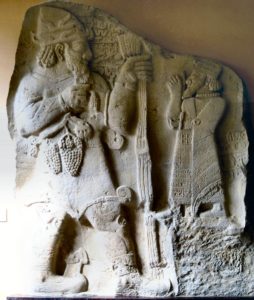 (alien giant Rimmon & his mixed-breed king before him)
(alien giant Rimmon & his mixed-breed king before him)
77. the great gods, the enlargers of my sovereignty, I assembled (my) chariots (and) armies, I occupied the banks of the Khabur. 7 On my march the tribute
78. abundant of Sallimmanu-khaman-ilani of the city of Sadikan, 8 the son of Ilu- Rimmon 9 of the city of Qatna, 10 silver, gold,
79. lead, plates of copper, variegated cloths, (and) linen vestments I received. To the city of ’Suri of Bit-Khalupe I approached;
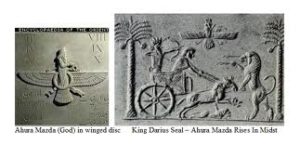 (Ashur in his weaponized sky-disc overwhelmed them)
(Ashur in his weaponized sky-disc overwhelmed them)
80. the fear of the glory (alien technologies) of Assur my lord overwhelmed them; the nobles (and) the elders of the city, to save their lives, came forth to meet me;
81. they took my feet, saying, Thou wiliest (it and) it is death, thou willest (it and) it is life, the will of thy heart will we perform. Akhi-yababa, the son of a plebeian
82. whom they had brought from Bit-Adini I seized by the hand. In the prowess of my heart and the violence of my weapons I attacked the city. All the soldiers who had rebelled
83. they had seized (and) delivered up. I brought my nobles into its palace (and) its temples: its silver, its gold, its goods, its spoil, copper,
84. iron, lead, plates of copper, sacrificial knives of copper, sacrificial bowls of copper, (other) objects of copper in abundance, alabaster, a cup
85. with handles, the amazons 1 of its palaces, its daughters, the spoil of the soldiers who had rebelled along with their goods, its gods along with their goods,
86. precious stones from the mountain, its chariot(s), (its) yokes of horses bound to the yoke, the trappings of the horses, the accoutrements of the soldiers,
87. variegated cloths, linen vestments, a beautiful altar of cedar-wood, sweet-smelling herbs, a shrine of cedar,
88. red purple (and) blue purple garments, 2 its wagons, its oxen, (and) its sheep, its exceeding spoil, which like the stars of heaven could not be numbered,
89. I carried away. Aziel I appointed over them as my vicegerent. I erected a pyramid at the approach to its chief gate. The nobles, as many as
90. had revolted, I flayed; with their skins I covered the pyramid. Some (of these) I immured in the midst of the pyramid; others above
91. the pyramid I impaled on stakes; others round about the pyramid I planted on stakes; many at the exit from my own country
92. I flayed; with their skins I clad the fortress-walls. The limbs of the chief officers who (were) the chief officers of the kings who had rebelled I cut off.
93. I brought Akhi-yababa to Ninevah (and) flayed him; with his skin I clad the fortress-wall of Ninevah. Power and might
94. I laid upon the land of Laqe. 1 While I was staying in the city of ’Suri the tribute of the kings of the land of Laqe every one of them,
95. silver, gold, lead, copper, a plate of copper, oxen, sheep, variegated cloths (and) linen vestments, as tribute
96. and gifts I prescribed (and) imposed upon them. At that time the tribute of Khayanu of the city of Khindan, 2 silver,
97. gold, lead, copper, umu stone, alabaster (?), red purple garments, (and) wild asses (?) as his tribute I received. At that time an image
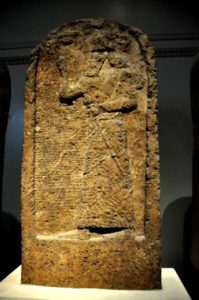 (Ashurnasirpal I stele, Assyrian giant mixed-breed King)
(Ashurnasirpal I stele, Assyrian giant mixed-breed King)
98. of my majesty grandly I made; (the story of my) power and exaltation I inscribed upon (it); in the midst of his palace I set (it) up. I erected my stelæ;
99. (the story of) the exaltation of my strength I inscribed upon (them); at the gate of his (city) I placed (them). In the same year during my eponymy, 3 by the command of Assur my lord and Uras who loves my priesthood,
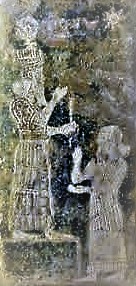 (Ashur kneels before father Marduk appearing as a dragon)
(Ashur kneels before father Marduk appearing as a dragon)
100. whereas in the time of the kings my fathers no one of the country of the Shuhites 4 had gone to the land of Assyria, Ilu-epus 5 the Shuhite, to save his life, together with his brothers (and)
101. his sons brought silver (and) gold as tribute to Nineveh to my presence. In the course of the eponymy 1 I was staying in the city of Ninevah when news
102. was brought that the Assyrian colonists whom Shalmaneser 2 king of Assyria, a prince who went before me,
103. had planted in the city of Khalzi-dibkha, 3 had revolted (with) Khulâ the lord of their city (and) were on the march to capture my royal city of Damda-mu’sa.

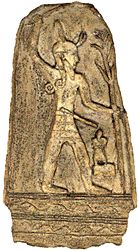
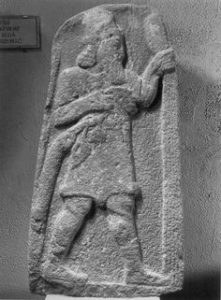 (Ashur, Shamash, & Adad stelea)
(Ashur, Shamash, & Adad stelea)
104. By the command of Assur, Samas (Shamash), and Rimmon, the gods my ministers I assembled my chariots (and) armies. At the head of the sources of the river ’Supnat, 4 where the image(s)
105. of Tiglath-Pileser and Tiglath-Uras king(s) of Assyria my fathers had been erected, I executed an image of my royal self (and) erected (it) by the side of theirs.
106. At that time the tribute of the country of Izala, oxen, sheep (and) wine I received. I crossed the mountain of Kasyari. 6 To the city of Kinabu,
107. the fortified city of Khulâ, I approached. With the strength of my army (and with) violent battle I attacked the city. I captured (it) Six hundred of their fighting men
108. I slew with the sword. Three thousand of their captives I burned with fire. I left not one alive among them to become a hostage. Khulâ
109. the lord of their city I captured alive with (my) hand. I built their bodies into pyramids. Their young men (and) their maidens I burned to ashes.
110. Khulâ the lord of their city I flayed. With his skin I clad the fortress-wall of the city of Damdamu’sa. The city I threw down, dug up (and) burned with fire.
111. I captured the city of Mariru which (was) dependent on them. Fifty of their warriors I slew with weapons; 200 of their captives I burned with fire; 332
112. soldiers of the country of Nirbi 1 I slew in combat in the field. I brought away their spoil, their oxen (and) their sheep. The (people of the) country of Nirbu which (lies) at the foot of Mount Ukhira
113. encouraged one another. Against the city of Tela, 2 their stronghold, I descended. From the city of Kinabu I departed. To the city of Tela I approached.
114. The city was very strong. Three fortress-walls surrounded (it). The inhabitants trusted to their strong walls and their numerous army, and had not descended (into the field).
115. They did not embrace my feet. With combat and slaughter I attacked the city (and) captured (it): 3000 of their fighting men I slew with the sword. Their spoil,
116. their goods, their oxen (and) their sheep I carried away. Their numerous captives I burned with fire. I captured many of the soldiers alive with the hand.
117. I cut off the hands (and) feet of some; I cut off the noses, the ears (and) the fingers of others; the eyes of the numerous soldiers I put out.
118. I built up a pyramid of the living (and) a pyramid of heads. In the middle (of them) I suspended their heads on vine-stems in the neighborhood of their city. Their young men
COLUMN II
1. (and) their maidens I burned as a holocaust. The city I overthrew, dug up (and) burned with fire. I annihilated it. The cities of the land of Nirbi
2. (and) their strong fortress-walls I overthrew, dug up (and) burned with fire. At that time from the country of Nirbi I departed. To the city of Tuskha 1
3. I approached. The city of Tuskha I restored afresh. Its old wall I changed. Its site I purified. Its strength I took (in hand). A new wall
4. from its foundations to its coping I built up, completed (and) strengthened. I erected a palace for the seat of my majesty at its gates. 2
5. I built this palace up from its foundations to its coping. I made an image of my person of white limestone. The might
6. of my power, the record and history of my conquests which I- achieved in the countries of Nairi 3 I inscribed upon (it). In the city of Tuskha
7. I set (it) up. I inscribed a tablet of stone. In its wall I placed (it). Those colonists from Assyria, who in consequence of a famine to other lands
8. (even) to the land of Rure had ascended I brought back. In the city of Tuskha I planted them. This city for myself
9. I took. Grain and straw from the land of Nirbi I heaped up within (it). ‘The remaining inhabitants of the land of Nirbi who had fled from the face of my weapons
10. descended (and) took my feet. Their cities (and) their houses (which were) suitable I caused them to occupy. As tribute and gifts, horses,
11. mules, oxen, sheep, wine, (and) plates of copper, in addition to what I formerly prescribed I imposed upon them. Their sons as hostages
12. I took. While I was staying in the city of Tuskha the tribute of Ammi-bahla, 1 the son of Zamani, of Ilu-Khite 2 of the land of Rure,
13. of Labdhuri the son of Dhubu’si of the land of Nirdun, and the tribute of the country of Urume of Bitani 3 (and) of the kings of the land of Nairi,
14. chariots, horses, mules, silver, gold, plate(s) of copper, oxen, sheep (and) wine, as their tribute I received.
15. I established a lord of the marches over the lands of Nairi. On my return from the lands of Nairi, the land of Nirbu which (is) within
16. the mountain of Kasyari revolted. Their nine cities they left. To the city of Ispilipria 4 their stronghold and the inaccessible mountain
17. they trusted, and the summits of the mountain I attacked (and) seized. In the midst of the mighty mountain I slew their warriors. With their blood like wool (?) the mountain
18. I dyed. What was left of them was swallowed up by the ravines and torrents of the mountain. Their spoil (and) their goods I carried away. The heads of their fighting-men
19. I cut off. I built up a column (of them) at the top of their city. Their young men (and) their maidens I burned as a holocaust. Into the lowlands of the city of Buliyani
20. I descended. The banks of the river Luqia I occupied. In my passage the cities of the land of Qurkhi 5 which (is) in the lowlands I conquered. Their numerous soldiers
21. I slew. Their spoil I carried away. The cities I burned with fire. To the city of Ardupa I came forth. At that time the tribute
22. of Akhi-ramu 1 the son of Yakhiri of the country of Zalla, 2 of the son of Bakhiani of the country of the Hittites, and of the kings of the country of Khani-rabbat, 3 silver, gold,
23. lead, plate(s) of copper, oxen, sheep (and) horses as their tribute I received. In the eponymy of Assur-idin 4 news was brought that
24. Tsab-Dadi 5 the prince of the country of Dagara had revolted. The (people of the) country of Zamua 6 throughout its circuit encouraged one another. The lowlanders of the city of Babite
25. built up a wall. To make war and battle they came against me. In reliance on Assur the great lord, my lord, and Nergal
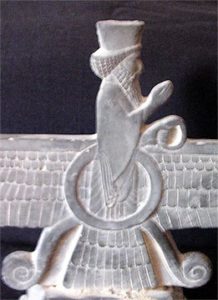
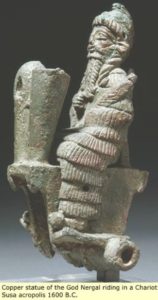 (Ashur & Nergal in their sky-chariots)
(Ashur & Nergal in their sky-chariots)
26. who marches before me, with the forceful weapons which Assur the lord gave unto me, my arms (and) armies I assembled; to the lowlands
27. of the city of Babite I marched. The inhabitants trusted to the strength of their armies and offered battle. In the powers supreme of Nergal who marches (softens the defenses of enemy earthlings)
28. before me I fought with them. I made a destruction of them. I shattered their forces; 1460 of their fighting-men in the lowlands
29. I slew. The cities of Uze, Birutu, (and) Lagalaga their stronghold, together with 100 towns dependent on them, I captured.
30. Their spoil, their possessions, their oxen (and) their sheep I carried away. Tsab- Dadi, to save his life, to an inaccessible mountain
31. ascended; 1200 of their soldiers I transported. From the city of Dagara I departed. To the city of Bara I approached. The city of Bara
32. I captured. Three hundred and twenty of their soldiers I slew with weapons. Their oxen, their sheep (and) their heavy spoil I brought away.
33. Three hundred of their soldiers I transported. On the i 5th day of the month Tisri 1 I departed from the city of Kalzi. 2 Into the lowlands of the city of Babite I descended.
34. From the city of Babite I departed. To the country of Nizir which they call the land of Lullu (and) the land of Kinipa 3 I approached. The city of Buna’si their stronghold
35. belonging to Mutsatsina and 20 cities dependent upon it I captured. The soldiers banded together; they occupied an inaccessible mountain. Assur-natsir-pal the hero after them
36. pursued like birds. In the mountain of Nizir he scattered their scouts; 326 of their fighting men he utterly destroyed. Its horses he seized.
37. The ravines and torrents of the mountain devoured their remnants. Seven cities which (are) in the country of Nizir, which they had made their strongholds, I captured. Their warriors
38. I slew. Their spoil, their goods, their oxen (and) their sheep I carried away. The cities I burned with fire. At my camp thereupon I made a halt.
39. From this camp I next departed. To the cities in the plain of the land of Nizir, 1 whose site had been seen by no one, I marched. The city of Larbu’sa,
40. the stronghold of Kirtiara (and) 8 cities dependent on it I captured. The men banded together; they occupied an inaccessible mountain. The mountain like the blade of an iron sword
41. was in appearance, the lair (?) 2 of his armies. After them I ascended. Into the midst of the mountain I threw their bodies; 172 of their warriors I slew; the soldiers
42. I piled up on the rocks of the mountain. Their spoil, their goods, their oxen (and) their sheep I brought away. The cities with fire
43. I burned. I hung their heads on the vines of the mountain. Their young men (and) their maidens I burned as a holocaust. Thereupon I made a halt at my camp;
44. from this camp I next marched forth. One hundred and fifty cities of the citizens of Larbu’sa, Dur-Luluma, Bunai’sa (and) Bara I captured.
45. Their warriors I slew. Their spoil I carried away. The cities I threw down, dug up (and) burned with fire. Fifty men of the city of Bara I slew in combat in the field.
46. At that time the kings of the country of Zamua, every one of them, were overwhelmed by the fear of the glory (alien technologies) of Assur my lord. They embraced my feet. Horses, silver (and) gold
47. I received. I made all the country to turn (to me) with one voice. I laid on them a present of horses, silver, gold, grain (and) straw.
48. I departed from the city (I had named) Tukulti-Assur-atsbat. 3 The foot of the mountain of Nispi I occupied. All the night I pursued (my march). To cities whose situation (is) remote, which in sight of the mountain of Nispi 1
49. are situated, which Tsab-Dadi had made his strongholds, I marched. The city of Birutu I captured (and) burned with fire. During the eponymy of Bel-aku 2 I was staying in Nineveh when news
50. was brought that Ameka (and) Arastua had withheld the tribute and dues of Assur my lord. By the command of Assur the great lord, my lord, (and) Nergal who goes before me,
 (Ashur)
(Ashur) 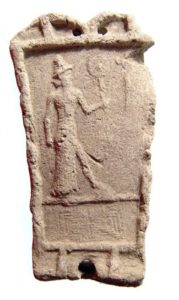 (Nergal)
(Nergal)
51. on the first day of the month Sivan 3 for the third time against the country of Zamua I made a campaign. 4 The face of my chariots and armies I could not see. From the city of Kalzi I departed. The lower Zab 5
52. I crossed. Into the lowlands of the city of Babite I entered. The river Radanu 6 I crossed. To the foot of the mountain of the country of ’Simaki I was continually 7 approaching. Oxen,
53. sheep (and) wine, the tribute of the country of Dagara I received. From the foot of the mountain of ’Simaki strong chariots 8 (and) riding-horses which had been bred there I brought away with me in store. 9 (All) night long till
54. dawn I pursued (my) march. The river Dhurnat 10 I crossed. In a car (?) of dark- blue stone I approached the city of Ammali the stronghold of Arastua.
55. With combat (and) slaughter I attacked the city; I captured (it); 800 of their fighting-men I slew with weapons. With their bodies I filled the streets of their city. With their blood
56. I dyed their houses. I captured the soldiers alive with the hand. Their numerous spoil I carried away. The city I overthrew, dug up (and) burned with fire. Their young men
57. (and) maidens I burned as a holocaust. The city of Kizirtu their
58. stronghold belonging to Zabini and the cities which (were) dependent upon them I captured. Their warriors I slew. Their spoil
59. I carried away. The cities of Bara belonging to Kirtiara, of Dura (and) of Buni’sa as far as the lowlands of the country of Khasmar I overthrew, dug up (and) burned with fire.
60. To mounds and ruins I reduced (them). From the midst of the cities of Arastua I departed. Into the lowlands which (are) in sight of the mountains of Lara (and) Bidirgi, inaccessible mountains, which for the passage
61. of chariots and soldiers were not suited, I descended. To the city of Zamri 1 the royal city of Ameka the Zamuan I approached. Ameka from the face of my mighty weapons (and) my battle
62. vehement fled away and betook himself to an inaccessible mountain. The furniture of his palace (and) his chariot I carried off. From the city of Zamri I departed. The river Lallu I crossed. To the mountains of Etini,
63. a difficult locality, which for the passage of chariots and armies was unsuited, into the midst of which none of the kings my fathers had penetrated, I marched. The king leaving his armies to the mountains of Etini
64. ascended. His property (and) his goods, numerous utensils of copper, a wild bull of copper, a plate of copper, bowls of copper, rings (?) of copper, the treasures of his palace (and) his treasury
65. from the midst of the mountains I carried off. At my camp thereupon I made a halt. In reliance upon Assur (and) Samas the gods my helpers from that camp I next departed. After him
66. I betook myself. The river Edir I crossed. To within sight of the mountains of ’Suani and Elaniu, mighty mountains, I slew their numerous warriors. His property, his goods, a wild bull of copper,
67. plates of copper, bowls of copper, cups of copper, numerous utensils of copper, a dish of gold with a handle, their oxen, their sheep, their goods,
68. (and) their heavy spoil I carried away from the foot of the mountains of Elaniu, I stripped him of his horses. Ameka, to save his life, ascended to the mountain of ’Sabua.
69. The cities of Zamru, Ara’sitku, Ammaru, Par’sindu, Iritu (and) ’Suritu his stronghold, together with 150 cities
70. which (were) dependent on it I overthrew, dug up (and) burned with fire. To mounds and ruins I reduced (them). While I was staying at the entrance to the city of Par’sindu, upon riding-horses (I made) the eunuchs
71. sit as a seat. Fifty fighting-men of Ameka I slew in the field. Their heads I cut off. On vines in the arbor of his palace I hung (them).
72. Twenty soldiers I captured alive with the hand. In the wall of his palace I immured (them). From the city of Zamri I carried the riding-horses (and) eunuchs along with me.
73. To the cities of Ata the Arzizan, into which none of the kings my fathers had penetrated, I marched. The cities of Arzizu (and) Ar’sindu
74. his stronghold, together with ten cities which (were) dependent on it, which are situated in the midst of the mountain of Nispi, an inaccessible mountain, I conquered. Their warriors I slew. The cities I overthrew, dug up (and) burned with fire.
75. To my camp thereupon I returned. At that time copper, tabbili of copper, rings of copper (and) bracelets, the tribute of the country of ’Sitammena, which like women
76. they wear, 1 I received. From the city of Zamri I departed. To the mountain of Lara, an inaccessible mountain, which for the passage of chariots and armies was unsuited, with axes of iron I hewed (my way).
77. With picks of bronze I excavated (my path). I made a passage for the chariots and soldiers. To the city of Tukulti-Assur-atsbat which the people of Lulu call Arakdi I descended. The kings
78. of the country of Zamua, every one of them, were terrified at the appearance of my weapons and the magnitude of my sovereignty, and embraced my feet. Tribute (and) gifts of silver, gold, lead,
79. copper, plates of copper, variegated cloths, horses, oxen, sheep (and) wine in addition to what I had before prescribed I imposed upon them. Their governor
80. in the city of Calah 2 I appointed. While I was staying in the country of Zamua, the cities of Khudun, Khartis, 3 Khupuska (and) Gozan 4 the fear
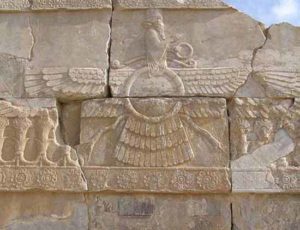 (overwhelming glory of Ashur in his sky-disc)
(overwhelming glory of Ashur in his sky-disc)
81. of the glory (alien technologies) of Assur my lord overwhelmed. Tribute (and) gifts of silver, gold, horses, variegated cloths, oxen, sheep (and) wine they brought to me., As for the men,
82. as many as had fled from the face of my weapons (and) had ascended the mountains, I marched after them. In sight of the countries of Aziru and ’Simaki they had encamped. The city of Me’su their stronghold
83. they had made. The land of Aziru I overthrew (and) dug up. From within sight of the country of ’Simaki as far as the river Dhurnat I piled up their corpses. Five hundred of their fighting-men I utterly destroyed.
84. Their heavy spoil I carried away. I burned the cities with fire. At that time in the country of Zamua the city of Adlilia, which ’Sibir king of Kar-Dunias 1 after capturing it had destroyed
85. (and) had reduced to mounds and ruins, Assur-natsir-pal king of Assyria restored again. Its wall I encircled. A palace for the seat of my majesty in the middle (of it) I founded, adorned (and) strengthened. In addition to what I had before prescribed
86. grain (and) straw from all the country I heaped up within (it). I called its name Dur-Assur. 2 On the first day of the month Sivan, during the eponymy of Sa- samu-damqu 3 I assembled my chariots (and) armies.
87. The river Tigris I crossed. Into the land of Kummukh I descended. A palace in the city of Tiluli I occupied (?) I received the tribute of the land of Kummukh. From the land of Kummukh I departed. Into the lowlands
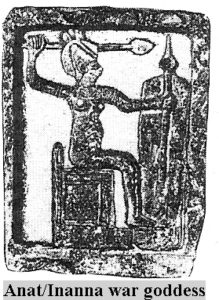 (Astarte / Inanna, Goddess of War in many cultures)
(Astarte / Inanna, Goddess of War in many cultures)
88. of the land of the Astartê (Inanna) goddesses 4 I descended. In the city of Kibaki I made a halt. Oxen, sheep, wine (and) plates of copper I received as the tribute of the city of Kibaki. From the city of Kibaki I departed.
89. The city of Matteyate I approached. The city of Matyaute (sic) together with the city of Kabranisa I captured: 2,800 of their soldiers I slew with weapons: their numerous spoil I carried away.
90. All the men who had fled from the face of my weapons embraced my feet. Their cities I let them occupy. Tribute, gifts (and) governors I appointed 1; upon them
91. I imposed. An image of my person I made. The power of my strength I inscribed upon (it). In the city of Matteyate I erected (it). From the city of Matteyate I departed. To the city of Zazabukha
92. I directed (my) camp. The tribute of the country of Qurkhi, oxen, sheep, wine, plates of copper, wild bulls of copper (and) bowls of copper I received. From the city of Zazabukha I departed.
93. In the city of Ir’sia I made a halt. I burned the city of Ir’sia with fire. The tribute of the city of ’Sura, oxen, sheep, wine (and) plates of copper I received in the city of Ir’sia.
94. From the city of Ir’sia I departed. In the midst of the mountain of Kasyari I made a halt. The city of MADARANZU (and) two cities which (were) dependent upon it I captured. Their warriors I slew.
95. Their spoil I carried away. I burned the cities with fire. For six days in the heart of the mountain of Kasyari, a mighty mountain, a locality difficult (of access), which for the passage of chariots and armies
96. was unsuited, the mountain with axes of iron I hewed, with picks of bronze I excavated. I made a passage for the chariots and soldiers. In the cities by the side of the bridge which (is) in the mountain of Kasyari
97. oxen, sheep, wine, plates of copper (and) bowls of copper I received. I crossed Mount Kasyari in the center. For the second time I descended into the lands of Nairi. (In) the city of Singisa 2
98. I made a halt. From the city of Sigisa I departed To the city of Madara, the stronghold of Labdhuri the son of Dhubu’si I approached. The city was very strong. Four walls
99. surrounded (it). I attacked the city. They dreaded the face of my powerful weapons, and its spoil, its goods (and) their sons I received in ransom. In place of their lives I accepted them. 1
100. Tribute, gifts (and) governors I imposed upon them. The city I overthrew (and) dug up. To a mound and ruin I reduced (it). From the city of Madara I departed. Into the city of Tuskhan 2
101. I descended. A palace in the city of Tuskhan I commenced. 3 The tribute of the country of Nirdun, horses, mules, plate(s) of copper, bowls of copper, oxen, sheep
102. (and) wine in the city of Tuskhan I received. Sixty cities (and) strong fortresses in the mountain of Kasyari belonging to Labdhuri the son of Dhubu’si I overthrew (and) dug up. To mounds
103. (and) ruins I reduced (them). In reliance on Assur my lord I departed from the city of Tuskhan. Gift (?) chariots 4 (and) riding-horses bred therein I carried off in store with me. By means of ropes
104. I crossed the Tigris. All night I pursued (my way). To the city of Pitura the stronghold of the Dirrans I approached. The city was very difficult (of access).
105. Two walls surrounded (it). Its citadel was situated like the peak of a mountain. Through the hands supreme of Assur my lord, (and) with the might of my armies and my vehement battle,
106. I fought with them. After two days, towards midday I roared upon them like Rimmon the inundator of the plain. I rained destruction upon them. With violence
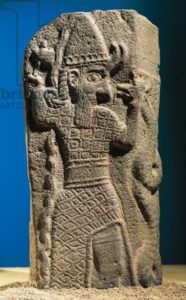 (Ishkur / Rimmon The Inundator)
(Ishkur / Rimmon The Inundator)
107. and power my fighting-men flew upon them like the vulture. I captured the city; Boo of their fighting-men I slew with weapons; their heads
108. I cut off. Many soldiers I took alive with the hand; the rest of them I burned with fire. Their heavy spoil I carried away. A pyramid of the living (and) of heads
109. I built up at the entrance to its chief gate. I impaled 700 men upon stakes at the approach to their great gate. The city I overthrew, dug up (and) reduced to a mound and ruin. Their young men
110. (and) their maidens I burned as a holocaust. The city of Kukunu which (is) at the mouth of the pass of the mountain of Madni I captured. I slew with weapons 700 of their soldiers.
111. Their numerous spoil I carried away. Fifty cities of the country of Dirra I captured. Their warriors I slew. Their spoil I carried away. Fifty soldiers I captured alive with the hand. The cities I overthrew,
112. dug up (and) burned with fire. I outpoured upon them the splendor of my sovereignty. From the city of Pitura 1 I departed. Into the city of Arbaki in the country of Qurkhi of Betani I descended.
113. They were terrified before the glory of my majesty, and deserted their cities (and) their strong fortresses. To save their lives they ascended Mount Madni, a mighty mountain.
114. I pursued after them. A thousand of their fighting-men I cut to pieces in the midst of the inaccessible mountain. With their blood I dyed the mountain. With their bodies the valleys
115. (and) torrents of the mountain I filled. I took 200 soldiers alive with the hand. I cut off their hands. I carried away 2000 captives. Their oxen (and) their sheep
116. to a countless number I took home. The towns of Iyaya (and) ’Salaniba, the strongholds of the city of Arbaki I captured. I slew their warriors. I carried away their spoil.
117. I overthrew (and) dug up 250 cities whose walls (were) strong in the countries of Nairi. To mounds and ruins I reduced (them). The harvests of their mountain I reaped; the corn
118. (and) straw I accumulated in the city of Tuskhan. Against Ammi-bahla the son of Zamani his nobles revolted and murdered him. In order to avenge
119. Ammi-bahla I marched. Before the appearance of my weapons and the grandeur of my sovereignty
120. they had fear, and chariots (with) yokes of horses, trappings of men (and) horses, 460
121. horses bound to the yoke, 2 talents of silver, 2 talents of gold, 100 talents
122. of lead, 100 talents of copper, 300 talents of iron, 100 plates of copper, 3000 handles of copper, bowls of copper, cups of copper,
123. 1000 variegated cloths, linen vestments, a dish of black wood, ivory (and) gold, the possessions
124. (and) treasure of the palace, 2000 oxen, 5000 sheep, his wife with her rich dowry (and) the daughters
125. of the nobles with their rich dowries I received.1 Assur-natsir-pal the great king, the powerful king, the king of multitudes, the king of Assyria, the son of Tiglath-Uras the great king, the powerful king,
126. the king of multitudes, the king of Assyria, the son of Rimmon-nirari the great king, the powerful king, the king of multitudes, the king of the same Assyria; the hero warrior who has marched in reliance upon Assur his lord, and among the kinglets
127. of the four zones has had no rival; the king who from the fords of the Tigris to the land of Lebanon and the great sea, 1
128. the land of Laqe throughout its circuit (and) the land of the Shuhites as far as the city of Rapiqi 2 has subdued beneath his feet; from the head of the sources
129. of the ’Supnat 3 as far as the lowlands of Bitani his hand has conquered; from the lowlands of Kirruri to the country of Gozan, from the fords of the Lower Zab
130. to the city of Tel-Bari which (is) above the land of Zaban, 4 from the city of the Tel 5 of Aptani to the city of the Tel of Zabdani, the cities of Khirimu (and) Kharutu (and) the country of Birate 6
131. belonging to Kar-Dunias 7 to the frontiers of my country I have restored (the territory), and the broad regions of the countries of Nairi throughout its whole extent I have conquered. I took the city of Calah (in hand) anew. The old mound
232. I changed. I deepened (it) as far as the level of the waters. To a depth of 120 tikpi I consolidated (it). The temple of Uras my lord upon the middle of it I founded. At that time
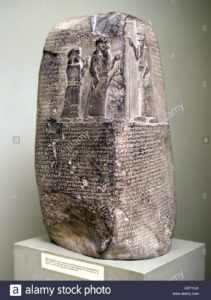 (Babylonian king with spouse before giant god Marduk)
(Babylonian king with spouse before giant god Marduk)
133. I made an image of the same Uras (Marduk) which did not previously exist in the inventiveness of my heart, even a colossus of his great divinity, with the best of mountain-stone and fine gold.
134. I accounted him my great divinity in the city of Calah. His festivals I ordained in the months Sebat and Elul. 1 His sanctuary which had not been built 2 I designed.
135. The holy of holies of Uras my lord I constructed firmly in the midst of it. The temple of Beltis (Ninlil), Sin (Nannar / Suen), 3 and Gula (Bau), the image of Ea (Enki) the king (and) the image of Rimmon the master of heaven and earth I erected.
COLUMN III
1. In the month Sivan, on the 22d day, during the eponymy of Dagon-bil-natsir, 4 I departed from the city of Calah. The Tigris I crossed. On the further bank of the Tigris
2. abundant tribute I received. In the city of Tabite I made a halt. On the 6th day of the month Tammuz I departed from the city of Tabite. I occupied the banks of the river Kharmis. 5
3. In the city of Margari’si I made a halt. From the city of Margari’si I departed. I occupied the banks of the river Khabur. 6 (In) the city of Sadikanni I made
4. a halt. The tribute of the city of Sadikanni, silver, gold, lead, plates of copper, oxen, (and) sheep I received. From the city of Sadikanni
5. I departed. In the city of Qatni I made a halt. The tribute of the city of the Qatnians I received. From the city of Qatni I departed.
6. In the city of Dur-Kadlime 1 I made a halt. From the city of Dur-Kadlime I departed. In the city of Bit-Khalupe I made a halt. The tribute
7. of the country of Bit-Khalupe, silver, gold, lead, plates of copper, variegated cloths, linen vestments, oxen (and) sheep I received.
8. From the country of Bit-Khalupe I departed. In the city of ’Sirqi 2 I made a halt. The tribute of the
9. (city of the ’Sirqians, silver, gold, lead, plates, oxen and) sheep I received. From the city of ’Sirqi I departed. In the city of Tsupri I made a halt. The tribute of the city of the Tsuprians, silver,
10. gold, lead, plates, oxen (and) sheep I received. From the city of Tsupria I departed. In the city of Naqarabani I made
11. a halt. The tribute of the city of Naqarabani, silver, gold, lead, plates, oxen (and) sheep I received. From the city of Naqarabani
12. I departed. At the approach to the city of Khindani I made a halt. On the further bank of the Euphrates it is situated.
13. The tribute of the city of the Khindanians, silver, gold, lead, plates, oxen (and) sheep I received. From the city of Khindani
14. I departed. In the mountains above the Euphrates I made a halt. From the mountains I departed. In Bit-Sabaya 3 at the approach to the city of Kharidi
15. I made a halt. The city of Kharudu (sic) is situated on the further bank of the Euphrates. From Bit-Sabaya I departed. At the head of the city of Anat 4
16. I made a halt. The city of Anat is situated in the middle of the Euphrates. From the city of Anat I departed. The city of ’Suru 1 the stronghold of
17. Sadudu of the land of the Shuhites I attacked. To the far-spread soldiers of the country of the Kassi 2 he trusted, and to make war and battle against me
18. he came. The city I attacked. For two days I fought within (it). Before my mighty weapons Saduta (sic) and 70 of his soldiers to
19. save his life plunged into the Euphrates. I captured the city. Fifty riding-horses and (their) grooms, the property of Nebo-baladan 3 king of Kar-Dunias
20. (and) Zabdanu his brother together with 3000 of their soldiers, (and) Bel-bal- iddin the prophet who went before their hosts I carried off captive along with them.
21. Many soldiers I slew with weapons. Silver, gold, lead, plates, precious mountain- stone for the adornment of his palace,
22. chariots, horses trained to his yoke, the trappings of the soldiers, the trappings of the horses, the amazons 4 of his palaces, his spoil
23. abundant I carried away. The city I overthrew (and) dug up. My prowess and power I laid upon the country of the Shuhites. The fear of my sovereignty prevailed as far as the country of Kar-Dunias.
24. The descent of my weapons overwhelmed the country of Kaldu. 5 On the countries beside the Euphrates I outpoured terror. An image
25. of my person I made. My prowess and power I inscribed upon (it). In the city of ’Suru I erected (it). Assur-natsir-pal the king whose fame
26. (and) power are everlasting, and whose face has been directed towards the desert; for his rule (and) his protection (?) his heart cries out. In the city of Calah I was Staying
27. (when) news was brought that the men of the country 1 of Laqe, of the city of Khindanu (and) of the country of the Shuhites had revolted, every one of them; the river Euphrates
28. they had crossed. On the 18th day of the month Sivan I departed from the city of Calah. I crossed the Tigris. I entered the desert. To the city of ’Suru
29. in Bit-Khalupe I approached. Boats for myself I constructed in the city of ’Suru. I occupied the water towards the source of the Euphrates. As far as
30. the narrows of the Euphrates I descended (the stream). The cities of Khenti-el (and) Azi-el of the country of Laqe I captured. Their warriors I slew. Their spoil
31. I carried away. The cities I overthrew, dug up (and) burned with fire. In the course of this campaign I encompassed the lakes 2 of the river Khabur as far as
32. the city of Tsibate in the land of the Shuhites. The cities on the hither bank of the Euphrates in the land of Laqe (and) in the land of the Shuhites I overthrew, dug up (and) burned with fire. 3 Their crops (?) I cut down. Four hundred and seventy
33. of their soldiers I slew with weapons. I captured 20 4 alive (and) impaled (them) on stakes. In the boats I had constructed,
34. the boats of hardened (?) skin, which were fastened from both sides 1 in the form of a pontoon, I crossed the Euphrates at the city of Kharidi. The people of the countries of the Shuhites (and) of Laqe
35. (and) of the city of Khindanu trusted to the strength of their chariots, their armies (and) their forces, and mustered 6000 of their soldiers to make war and battle.
36. When they came forth against me, I fought with them. I utterly destroyed them. Their chariots I minished. I slew 6500 (sic) of their fighting-men with weapons. What was left of them
37. was devoured by the Euphrates amid famine in the desert. 2 From the city of Kharidi in the country of the Shuhites as far as the city of Kipina the cities of the people of Khindanu
38. (and) of Laqe which (are) on the further bank (of the Euphrates) I captured. Their warriors I slew. Their spoil I carried away. The cities I overthrew, dug up (and) burned with fire. Azi-el the Laqian
39. trusted to his forces and occupied the fords at the city of Kipina. I fought with them. (Starting) from the city of Kipina I utterly destroyed them. A thousand
40. of his soldiers I slew. His chariots I minished. His abundant spoil I carried away. His gods I carried off. To save his life Mount Bi’suru, 3 an inaccessible mountain towards the source
41. of the Euphrates, he occupied. For two days I pursued after him. The relics of his army I slew with weapons. The mountain (and) the Euphrates devoured those I had destroyed of them. 4 As far as
42. the cities of Dummete 5 (and) Azmu, the cities of the son of Adinu, I pursued him. The relics of his army I slew with weapons. His abundant spoil, his oxen (and) his sheep,
43. which like the stars of heaven were numberless I carried away. At that time I carried off Ila the Laqian, his chariots (and) yokes of horses, (and) 500 of his soldiers.
44. To my country of Assyria I brought (them). The cities of Dummut and Azmu I captured, overthrew, dug up (and) burned with fire. From the narrows of the Euphrates I came out. In the course of this campaign
45. I encompassed Azi-el. Before my mighty weapons, in order to save his life, he ascended (the country). Ila, the prince of the land of Laqe, his soldiers, his chariots (and) his teams
46. I carried off. To my city of Assur 1 I brought (them). Khimti-el the Laqian I besieged in his city. By the help of Assur my lord before my mighty weapons, my vehement battle
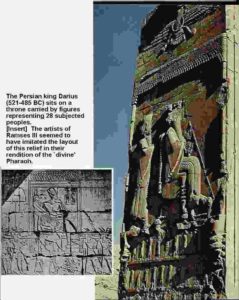 (Ashur in sky-disc above protecting his giant mixed-breed king)
(Ashur in sky-disc above protecting his giant mixed-breed king)
47. (and) my enormous forces he was terrified, and the booty of his palace, silver, gold, lead, copper, plates of copper (and) variegated cloths, his abundant spoil, I received, and tribute
48. (and) gifts above what I had before prescribed I imposed upon them. At that time
50 strong wild bulls on the further side of the Euphrates I killed; 8 wild bulls
49. I captured alive with the hand; 20 esir-birds I killed; 20 esir-birds I caught alive with the hand. I founded two cities upon the Euphrates, one on the hither bank
50. of the Euphrates whose name I called Kar-Assur-natsir-pal, 2 the other on the further bank of the Euphrates whose name I called Nibarti-Assur. 3 On the 20th day of the month Sivan I departed from the city of Calah;
51. I crossed the Tigris; to the country Of Bit-Adini I marched. To the city of Kar-rabi 1 their stronghold I approached. The city was very strong. Like a cloud of heaven it was elevated.
52. The inhabitants trusted to their numerous soldiers and descended not to embrace my feet. By the command of Assur the great lord, my lord, and Nergal who marches before me I attacked the city.
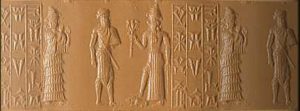 (Ninsun, her giant mixed-breed son-king, & Nergal)
(Ninsun, her giant mixed-breed son-king, & Nergal)
53. With mounds (?) 2 overthrowing (?) (and) battering-rams I captured the city. Their numerous warriors I slew. I utterly destroyed 800 of their fighting-men. This spoil (and) their goods I carried away; 2400
54. of their soldiers I carried off. To the city of Calah I transported (them). The city I overthrew, dug up (and) burned with fire. I put an end to it. I laid the fear of the glory of Assur my lord upon Bit-Adini.
55. At that time the tribute of Akhuni the son of Adini (and) of Khabini of the city of Tel-Abna, 3 silver, gold, lead, copper, variegated cloths, linen vestments (and) beams
56. of cedar, the treasures of his palace, I received. I took their hostages. I extended mercy to them. On the 8th day of the month Iyyar 4 I departed from the city of Calah. The Tigris
57. I crossed. To the city of Carchemish 5 in the country of the Hittites I took the road. To the country of Bit-Bakhiani I approached. The tribute of the son of Bakhiani, chariots, teams, horses, silver,
58. gold, lead, copper (and) plates of copper I received. The chariots, riding-horses (and) grooms of the son of Bakhiani I took away with me. From Bit-Bakhiani I departed.
59. To the country of Azalli 1 I approached. The tribute of Dadu-imme 2 the [A]zalian, chariots, teams, horses, silver, gold, lead, copper,
60. plates of copper, oxen, sheep (and) wine I received. The chariots, riding-horses (and) grooms I carried off in store with me. From the country of Azalli I departed. To Bit-Adini I approached.
61. The tribute of Akhuni the son of Adini, silver, gold, lead, copper, plate(s) of copper, dishes of ivory, couches of ivory, yokes of ivory,
62. thrones made of ivory, of silver (and) of gold, torques of gold, beads 3 of gold in large quantities, pendants (?) of gold, a sword-blade of gold, oxen, sheep (and) wine as his tribute I received.
63. The chariots, riding-horses (and) grooms of Akhuni I carried off with me. At that time the tribute of Khabini of the city of Tel-Abna, 4 manehs of silver (and) 400 sheep I received from him.
64. Ten manehs of silver in his first year as a tribute I imposed upon him. From the country of Bit-Adini I departed. The Tigris at its flood in boats of hardened (?) skin thereupon
65. I crossed. To the country of Carchemish I approached. The tribute of ’Sangara king of the country of the Hittites, 20 talents of silver, beads of gold, a chain of gold, sword-blades (?) of gold, 100 talents
66. of copper, 250 talents of iron, sacred bulls of copper, bowls of copper, libation- cups of copper, a censer (?) of copper, the multitudinous furniture of his palace, of which the like
67. was never received, 4 couches, seats (and) thrones, dishes (and) weapons made of ivory, 200 slave-girls, variegated cloths,
68. linen vestments, black transparent stuffs (and) gray transparent stuffs, sirnuma stones, the tusks of elephants, a white chariot, (and) small images of gold in quantities, the ornaments of his royalty, I received from him. The chariots,
69. riding-horses (and) grooms of the city of Carchemish I carried off with me. All the kings of the (surrounding) countries came to my presence and embraced my feet. Their hostages I took.
70. They rejoiced at my face. To the land of Lebanon they went. From the city of Carchemish I departed. In sight of the countries of Munzigani (and) Khamurga I took (my way).
71. I passed the country of Akhanu on my left. To the city of Khazazi 1 belonging to Lubarna the Patinian I approached; gold, cloths (and) linen vestments I received.
72. I forded the river Apre. 2 I crossed (it) making a halt. From the banks of the Apre I departed. To the city of Kunulua 3 the capital of Lubarna the Patinian
73. I approached. The face of my powerful weapons (and) vehement battle he feared, and to save his life he embraced my feet. Twenty talents of silver, one talent of gold,
74. 100 talents of lead, 100 talents of iron, 1000 oxen, 10,000 sheep, 1000 variegated cloths (and) linen vestments, small images (and) weapons in quantities,
75. the legs of couches, seats (and) couches in quantities, dishes of ivory (and) numerous utensils, the multitudinous furniture of his palace, the like of which
76. had never been received, so female musicians, rings (and) numerous … 4 (and) the great maces (?) 5 of the great lords, as his tribute I received from him. Mercy unto him
77. I extended. The chariots, riding-horses (and) grooms of the Patinians I carried off with me. His hostages I took. At that time the tribute of Gu’si 1
78. the Yakhanian, silver, gold, lead, [copper], 2 oxen, sheep, variegated cloths, (and) linen vestments, I received. From the city of Kunulua the capital of Labarna
79. the Patinian I departed. The river [Oron]tes I crossed. On the banks of the Orontes I halted. From the banks of the Orontes I departed. In sight
80. of the countries of Yaraqi 3 (and) Yahturi I took (my way). The country of … ku I traversed. On the banks of the river ’Sangura 4 I made (a halt). From the banks of the river ’Sagura (sic) I departed. In sight
81. of the countries of ’Saratini (and) Kalapan 5 I took (my way). On the banks [of the river] … I made [off]erings. Into the city of Aribua the stronghold of Lubarna I entered.
82. The city I took for myself. The corn and straw of the country of Lukhuti I harvested (and) heaped up within (it). I made a feast in his palace. Colonists from Assyria
83. I settled within (it). While I was staying in the city of Aribua I conquered the cities of the land of Lukhuti. Their numerous warriors I slew. I overthrew, dug up, and with fire
84. I burned. I captured (some) soldiers alive with the hand. On stakes I impaled (them) at the approach to their cities. At that time I occupied the slopes of Lebanon. To the great sea
85. of Phœnicia I ascended. At the great sea I hung up my weapons. I offered sacrifices to the gods. The tribute of the kings of the coasts of the sea,
86. of the Tyrians, the Sidonians, the Gebalites, the Makhallatians, the Maizians, the Kaizians, 1 the Phœnicians, and of the citizens of Arvad
87. in the middle of the sea, silver, gold, lead, copper, plate[s] of copper, variegated cloths, linen vestments, great maces (?) (and) small maces (?),
88. usu wood, seats of ivory (and) a porpoise the offspring of the sea, as their tribute I received. They embraced my feet. To the mountains of Khamani 2 I ascended. Logs
89. of cedar, sherbin, 3 juniper (and) cypress I cut. I offered sacrifices to my gods. I erected a memorial of my warlike deeds. Upon it I wrote (?) 4
90. The logs of cedar were transported (?) from the mountain of Amanus, as materials for E-sarra, 5 for my temple have I stored (them), even (for) the Temple of Rejoicing (and) for the temple of Sin and Samas the holy gods.
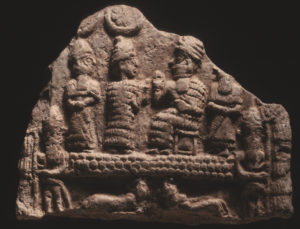 (Utu, Inanna, father Nannar, & damaged Papsukal)
(Utu, Inanna, father Nannar, & damaged Papsukal)
91. To the country of fir-trees 6 I went. The country of fir-trees throughout its whole extent I conquered. Logs of fir I cut. To the city of Ninevah
92. I brought (them). To Istar (Inanna) the lady of Ninevah, my benefactress I offered (them). During the eponymy of Samas-nuri, 7 by the command of Assur the great lord, my lord, on the 20th day of the month Iyyar 8 from
93. the city of Calah I departed. The Tigris I crossed. Into the land of Qipani I descended. The tribute of the city-chiefs of the land of Qipani in the city of Khuzirina
94. I received. While I was staying in this city of Khuzirina the tribute of Ittih the Zallian (and) Giri-Dadi 1 the Assaian, silver,
95. gold, oxen (and) sheep, I received. In those days beams of cedar, silver (and) gold, the tribute of Qata-zili
96. the Komagenian I received. From the city of Khuzirina I departed. The banks of the Euphrates towards (its) upper part I occupied. The country of Kuppu
97. I traversed. I entered the midst of the cities of the countries of Assa (and) Qurkhi which (are) opposite to the land of the Hittites. The cities of Umalia (and) Khiranu
98. the strongholds which are situated in the neighborhood of the country of Adani I conquered. Their numerous warriors I slew. Their spoil to a countless amount
99 I carried away. The cities I overthrew (and) dug up. I burned with fire 150 cities which were dependent on them. From the city of Karania
100. I departed. Into the lowlands of the country of Amadani 2 I descended. Into the midst of the country of Dirria I entered. The cities in sight
101. of the countries of Amadani (and) Arqania I burned with fire. The country of Mallanu which adjoins the country of Arqania I took for myself. From the country of Mallanu I departed.
102. Into the cities of the country of Zamba on the banks of the bridge (I entered and) burned (them) with fire. The river Tsua I crossed. On the river Tigris I made (a halt). The cities
103. on the hither and further side of the Tigris, in the country of Arkania (sic) I reduced to mounds and ruins. All the land of Qurkhi was afraid and my feet
104. embraced. Their hostages I took. I appointed a governor of my own to be over them. From the lowlands of the country of Amadani I came out at the city of Barza-nistun. 1
105. To the city of Damdammu’sa the stronghold of Ilani the son of Zamani 2 I approached. The city I besieged. My warriors flew like bird(s) upon them.
106. I slew 600 of their fighting-men with weapons. I cut off their heads. I captured 400 soldiers alive with the hands.
107. I brought away 3000 of their captives. I took this city for myself. The living soldiers (and) the heads I brought to the city of Amedi his capital. 3
108. I built up a pyramid with the heads at the approach to his main gate. The living soldiers I impaled on stakes at the gates of his city.
109. I fought a battle within his main gate. I cut down his plantations. From the city of Amedi I departed. Into the lowlands of Mount Kasyari (and) of the city of Allab’sia
110. which none among my fathers had cut off or proclaimed (war) against (and) approached, 4 I descended. The city of Uda the stronghold of Labdhuri, the son of Dhubu’si
111. I approached. The city I attacked. With mounds (?) battering-rams (?) and war- engines I captured the city. I slew 14[00] of their soldiers with weapons. Five hundred and eighty men alive
112. I took with the hand. I brought away 3000 of them captive. The soldiers (I had captured) alive I impaled on stakes round about his [city]. Of some
113. I put out the eyes. The rest of them I transported (and) brought to Assyria. The city I took for [myself]. Assur-natsir-pal the great king, the powerful king, the king of Assyria; the son of Tiglath-Uras,
114. the great king, the powerful king, the king of multitudes, the king of Assyria; the son of Rimmon-nirari the great king, the powerful king, the king of multitudes, the king of the same Assyria; the warrior hero, who has marched in reliance upon Assur his lord and among the kinglets of the four zones
115. has no rival; the shepherd of fair shows who fears not opposition, the unique one, the strong one who has no confronter, the king who subdues the disobedient, who all
116. the legions of the mighty has conquered; the powerful male who tramples on the neck of his enemies, who treads upon hostile lands, who breaks in pieces the squadrons of the strong, who in reliance on the great gods
117. his lords has marched, and his hand has overcome all countries, has conquered all mountains and has received all their tribute; the exacter of hostages, who has established empire
118. over all the world. At that time Assur the lord the proclaimer of my name, the magnifier of my sovereignty, his unsparing weapon to the hands of my lordship
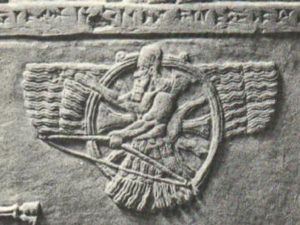 (Ashur in sky-disc loaded with alien weaponry)
(Ashur in sky-disc loaded with alien weaponry)
119. entrusted. The widespread forces of the land of Lullume I slew with weapons in mid battle. By the help of Samas
120. and Rimmon, the gods my ministers, over the forces of the countries of Nairi, the country of Qurkhi, the country of Subari and the country of Nirbe 1 I roared like Rimmon the inundator.
121. The king, who from the fords of the river Tigris to the mountains of Lebanon and the great sea, the land of Laqe throughout its circuit, the land of the Shuhites as far as the city of Rapiqi
122. has subdued beneath his feet. From the head of the sources of the river ’Supnat to the lowlands of Bitani his hand has conquered. From the lowlands of Kirruri to
123. the country of Gozan, from the fords of the Lower Zab to the city of Tel-Bari 1 which is above the Zab as far as the city of the Mound of Zabdani and the city of the Mound
124. of Aptani, the city of Khirimu, the city of Kharutu, the country of Birate 2 belonging to Babylonia I have restored to the frontiers of my country. From the lowlands of the city of Babite
125. to the country of Khasmar I have accounted (the inhabitants) as men of my own country. In the lands which I have conquered I have appointed my governors. They have done homage. Boundaries
126. I have set for them. Assur-natsir-pal, the exalted prince, the adorer of the great gods, the unique monster, the lusty, the conqueror of cities and mountains to their furthest limits, the king of lords, the consumer
127. of the strong, the hero who spares not, the annihilator of opposition, the king of all kinglets, the king of kings, the exalted prophet, named by Uras the warrior, the hero
128. of the great gods, the king who in reliance upon Assur and Uras the gods his ministers has marched in righteousness, and trackless mountains and hostile princes (with) all
129. their countries has subdued beneath his feet. With the foes of Assur above and below he has contended and has imposed upon them tribute and gifts. Assur- natsir-pal
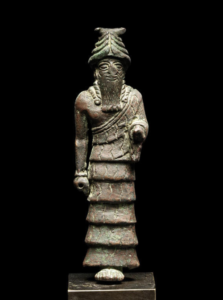 (Nannar)
(Nannar) 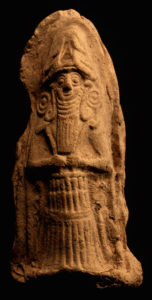 (Anu, King of all the alien Anunnaki gods)
(Anu, King of all the alien Anunnaki gods)
130. the powerful king, named by Sin, 3 the servant of Anu, 1 the favorite of Rimmon, 2 the strongest of the gods, the weapon unsparing, the slaughterer of the land of his enemies (am) I. The king (who is) strong in battle,
131. the destroyer of cities and mountains, the firstborn of battle, the king of the four zones, the subjugator of his foes, of mighty countries (and) of [trackless] mountains. Kings valiant and unsparing (?) from the rising
132. of the sun to the setting of the sun have I subdued beneath my feet. One speech have I made them utter. The former city of Calah which Shalmaneser 3 king of Assyria, a prince who went before me, built,
133. this city had fallen into decay and had become a mound and a ruin. To restore this city anew I worked. The men whom I had captured from the countries I had conquered, from the land of the Shuhites, from the land of Laqe
134. throughout its circuit, from the city of ’Sirqi at the ford of the Euphrates (and) the country of Zamua to its furthest limits, from Bit-Adini and the land of the Hittites, and from Liburna the Patinian, I took (and) planted within (it).
135. A canal from the Lower Zab I excavated (and) the river Pati-khigal 4 I called its name. I established plantations in its neighbourhood. I brought fruit and wine for Assur my lord and the temples of my country.
136. I changed the old mound. I dug deep as far as the level of the water. I sunk (the foundations) 120 tikpi to the bottom. I built up its wall. I built (it) up (and) completed (it) from its foundation to its coping-stone.
Footnotes
134:1 E-kur (Enlil’s temple in Nippur),
opposed to E-sarra, the temple of the firmament. It represented the earth and the lower world, and so became synonymous with Arabi or Hades. Temples were built after the supposed likeness of this “temple of the earth,” and the name consequently came to signify a “temple” in general. Uras was the messenger of Mul-lil “the lord of the ghost-world,” worshipped at Nipur or Niffer, and identified by the Semites with their supreme Bel. His connection with the ghost-world or Hades explains why Uras should be called “the offspring of the temple of the earth.”
135:1 Now represented by the mounds of Nimrûd at the junction of the Upper or Great Zab and the Tigris.
135:2 This is Bel (Enlil) of Nipur, the Accadian Mul-lil, not the younger Bel-Merodach (Marduk) of Babylon.
135:3 The Assyrian Dagon was a word of Accadian origin meaning “exalted.” He was usually associated with Anu the sky-god, and the worship of both was carried as far west as Canaan. Anat, the wife (mistress) of Anu, gave her name to the Canaanite town of Beth-Anath (Josh. xix. 38).
135:4 Edû, which of course does not mean “a flood” here.
136:1 Usumgal, a fabulous beast which was supposed to devour the corpses of the dead. Comp. Isaiah xiii. 21, 22; xxxiv. 14.
136:2 The Sun-god.
137:1 Isriti or esrête, of the same origin as the Hebrew ashêrâh, the symbol of the goddess of fertility, mistranslated “grove” in the authorised version of the Old Testament.
138:1 The Ashtoreth (Sarpanit) of the Old Testament.
138:2 This must be a different Nimme from the Armenian one, in the neighbourhood of the modern Mush, mentioned by Tiglath-Pileser I. See vol. i. p. 106, note 1.
138:3 The name can also be read, but with less probability, Gubbê.
139:1 The Mount Etini in eastern Kurdistan mentioned in col. ii. line 62.
139:2 Lallik for lu allik.
139:3 Akul for yakul after sade.
139:4 Kirruri (or Gurruri) was the district under Mount Rowandiz in Kurdistan, eastward of Assyria, from which a pass led directly into the city of Arbela.
139:5 ’Sime’si lay immediately to the north-east of the pass of Holwan.
140:1 Adaus is mentioned by Tiglath-Pileser I; see vol. i, p. 102.
140:2 Or Kharga’sians.
140:3 The word is expressed by ideograph s which signify “animals with large feet.” It is therefore probable that a species of horse, like our cart-horse, is meant rather than mules.
140:4 Gozan lay to the south of the kingdom of Ararat between the northern bank of the Tigris and Lake Van. Whether the country of Gozan had anything to do with the city of Gozan which gave its name to Gauzanitis in classical times is doubtful. The city seems to be meant by the Gozan of Scripture (2 Kings xix. 12) which lay on the river Khabour. Khupuska lay to the north of Assyria and the Upper Zab.
140:5 Qurkhi of Betani or Armenia extended eastward of Diarbekir along the northern bank of the Tigris. See vol. i. p. 96, note 3. Qurkhi formed the eastern boundary of the Hittite tribes.
140:6 The name-of this city seems to signify “Hittite.”
140:7 A variant text gives Artsuain. It may be the Artsuinis of the Vannic inscriptions, the modern Sirka near Van.
140:8 Perhaps the modern Tilleh, at the junction of the Sert river and the Tigris.
140:9 This seems to be the earliest form of the name of Urardhu, the Biblical Ararat.
141:1 A variant text gives Babua.
141:2 The Tigris seems to be referred to rather than the Euphrates.
141:3 B.C. 883.
141:4 July.
142:1 The Komagênê of classical geography; see vol. i. p. 95, note I.
142:2 The Moskhi of classical geography, the Meshech of the Old Testament; see vol. i. p. 94, note 3.
142:3 The modern Helebi on the western bank of the Euphrates, midway between the mouths of the Balikh and the Khabour. The classical Sura (now Surieh), a little above the mouth of the Balikh, preserved the name of the ’Suru.
142:4 The name means “the Hamathite.“
142:5 Literally “the son of nobody.“
142:6 Bit-Adin was on the eastern bank of the Euphrates, not far from its junction with the Balikh. It may be the Eden of Ezek. xxvii. 23 and 2 Kings xix. 12.
142:7 The modern Khabour, which joins the Euphrates at the site of Circesium.
142:8 Now Arban, on the eastern bank of the Khabour, where Sir A. H. Layard discovered the remains of a palace. Dr. Peiser may be right in reading the name Gar-dikan.
142:9 Or Ilu-Dadu, “Hadad (Adad) is god.” Dadu or Hadad was the Syrian name of the deity which the Assyrians identified with their Rimmon. The compound Hadad-Rimmon is found in Zech. xii. 11.
142:10 We may compare the name of Yoktan in Gen. x. 25. In W. A. I. ii. 60, 30, mention .is made of “Qatnu the god of the city of Qatan.”
143:1 Literally “female soldiers.”
143:2 Argamanu takiltu, the Hebrew argamân and thekêleth, Exod. xxv. 26, xxvi. 4.
144:1 The land of Laqe adjoined the territory of the ’Suru on the north.
144:2 Khindan may be the Giddan of classical geography, on the eastern bank of the Euphrates.
144:3 Literally “in the eponymy of the year of my name.”
144:4 Assyrian ’Sukhi. Their territory extended along the western bank of the Euphrates, from the mouth of the Balikh to the mouth of the Khabour. It was to the Shuhites that Bildad (Bel-Dadu), the friend of Job, belonged (Job ii. 11).
144:5 Or, as it may also be read, Ilu-bani.
145:1 Limesamma.
145:2 Shalmaneser I, the builder of Calah, B.C. 1300.
145:3 Or Khalzi-lukha.
145:4 The Sebbeneh Su, which falls into the Tigris to the north of Diarbekir.
145:5 Tiglath-Pileser I, B.C. 1130, and Tiglath-Uras, B.C. 889–883, are referred to.
145:6 The Mount Masius of classical geography.
146:1 The “lowlands” in the neighbourhood of Diarbekir. The “land of the Hittites” lay immediately to the east of them.
146:2 Possibly the same as the Tela of line 60.
147:1 Also called Tuskhan. It lay between Mount Masius and the Tigris, south of Diarbekir.
147:2 Or according to a variant text: “I founded a palace for the seat of my majesty in the midst (of it); I made doors; at its gates I erected (them).”
147:3 The district between Lake Van and the northern frontier of Assyria; see vol. i, p. 106, n. 7.
148:1 The name means “Ammi is Baal.” Ammi or Ammon was the supreme god of Ammon, as found in the name of Ammi-nadab, a king of Ammon in the time of Assur-bani-pal. Dr. Neubauer has shown that the name also occurs in the compounds Rehobo-am (the son of an Ammonitess), Jerobo-am, and Bal-aam. Salaam came from “the land of the children of Ammo” (rendered “his people” by the A. V.; Numb. xxii. 5).
148:2 Or, perhaps, Ankhite. But the name seems to mean “A god is Khite” (? the Hittite deity).
148:3 Bitani is the district south of Lake Van. Urume may be the Urima of classical geography, the modern Urum. See vol. i. p. 99, n. 3.
148:4 One of the Vannic gods was called Elipris, and a Vannic chieftain had the name Lut-ipris. The suffix –a in Vannic denotes “the people of.”
148:5 See above, p. 140, n. 5.
149:1 The same name as that of Hiram king of Tyre.
149:2 Called Azalla in col. iii. line 99. It bordered Bit-Adin on the northwest, the district belonging to “the son of Bakhian” being again to the north of it.
149:3 “Khani the great,” so called to distinguish it from another Khani nearer Babylonia. It was the district of which Malatiyeh was the capital.
149:4 B.C. 882.
149:5 “The man of Hadad” or Rimmon. The name may also be read Nur-Dadi, “the light of Hadad.”
149:6 Zamua lay among the mountains of eastern Kurdistan, between Sulamaniyeh and the Shirwan, and must be distinguished from another Zamua, called “Zamua of Bitani,” and more correctly Mazamua, which adjoined the shores of Lake Van.
150:1 September.
150:2 Now Shamamah (Hazeh), south-west of Arbela.
150:3 The “mountain of Nizir“ was that on which the ark of the Chaldæan Noah was believed to have rested. It lay among the Kurdish mountains of Pir Mam, a little to the south of Rowandiz, between latitudes 35° and 36°. The sentence may also be rendered “which the (people of) Lullu call Kinipa,” and Lullu may be identified with the country called Lullubu. Cp. line 77.
151:1 Not “above the mountain of Nizir,” as Peiser reads.
151:2 Manta, from manitu, “a couch.”
151:3 “I have put my trust in Assur,”
152:1 A variant text has “in sight of the whole mountain (and) the plain” (Edinu).
152:2 B.C. 881. The reading of the name of the eponym is uncertain.
152:3 May.
152:4 Literally “a muster.”
152:5 The Kapros of classical geography, which flows from the east into the Tigris a little to the south of Kalah Sherghat (the ancient Assur).
152:6 The modem Adhem, which passes through the district of Râdhân. It was the Physkos of classical geography, joining the Tigris at Opis.
152:7 Literally “all my days.”
152:8 A variant text has “gift-chariots.”
152:9 Literally “I deposited with myself.”
152:10 The Tornadotus of classical geography, the modern Diyâleh, which falls into the Tigris a little below Bagdad.
153:1 Compare the Zimri of Jer. xxv. 25.
155:1 Tsapruni; not from tsaparu, “to murmur.”
155:2 Now Nimrûd.
155:3 Or Murtis.
155:4 See above, p. 140, note 4.
156:1 Babylonia.
156:2 “The fortress of Assur.“
156:3 B.C. 880.
156:4 We know front the treaty concluded between Ramses II and the Hittites that the Hittites worshipped Astarte‘ by the side of their supreme god Sutekh. The goddess who presided over Hierapolis, the successor of Carchemish in classical times, was Alargatis, that is Atar-’Ati or Astartê-’Ati.
157:1 Literally “strengthened.”
157:2 Or Sigisa, according to a variant text.
158:1 Literally “to the preservation of their lives I turned them.“
158:2 Also written Tuskha.
158:3 Or, perhaps, “laid out broadly.”
158:4 The printed text has “weapons.”
159:1 Also written Bitura.
160:1 An inscription of Assur-natsir-pal, engraved on a monolith found among the ruins of Kurkh on the Tigris (20 miles below Diarbekir), has the following variant account of the campaign:—“(42) I flayed the skin of Bur-ramânu the rebel: I covered (with it) the wall of the city of ’Sinabu. Arteanu his brother I raised to the chieftainship; (43) 2 manehs of gold, 13 manehs of silver, 1000 sheep (and) 2000 … as tribute … I imposed upon him. The cities of ’Sinabu (and) Tidu, the fortresses which [(44) Shalmaneser king of Assyria, a prince who went before me, had occupied for himself against the country of Nairi, which the Arumu Aramæans] had taken away by force, to (45) myself I restored: the men of the city of Assur who had garrisoned the fortresses of (the god) Assur in the land of Nairi, whom in the land of Arumu (the Aramæans) (46) had oppressed, their cities [and] their farmsteads [bit-kummi] which had been destroyed (?) I caused them to occupy (and) I settled them in quiet seats. Fifteen hundred (47) soldiers, Akhlame from the country of Arman [Aramæans?] belonging to Ammi-pahli the son of Zamâni I removed, to Assyria I brought (them). The harvests of Nairi (48) I cut down; in the cities of Tuskha, Damdamu’sa, ’Sinabu (and) Tidu for the benefit of my country I stored (them) up. (49) The cities of the countries of Nirdun (and) Luluta, the city of Ki(?)rra (and) the countries of Aggunu, Ulliba, Arbaki and Nirbe I conquered, their fighting-men I slew, (50) their spoil I carried away, their cities I threw down, dug up (and) burned with fire. To mounds and ruins I reduced (them). Taxes (Heb. halâk), tribute, and a governor I imposed upon the country of Nairi. (51) My own prefect I imposed upon them; they performed homage. The sight of my weapons (and) the terror of my sovereignty I outpoured upon the land of Nairi.”
161:1 The Mediterranean.
161:2 On the north-western frontier of Babylonia.
161:3 The Sebbeneh Su, which joins the Tigris north of Diarbekir.
161:4 Zaban was on the southern side of the Lower Zab.
161:5 Or “mound.”
161:6 “Fortresses.”
161:7 Babylonia.
162:1 January and August.
162:2 Or perhaps “with bowing down.”
162:3 The Moon-god (Nannar).
162:4 B.C. 879.
162:5 The classical Hermos or Hirmas, flowing into the Khabour. Nisibis was built upon its banks.
162:6 The modern Khabour.
163:1 Or Dur-Kumlime.
163:2 The Circesium of classical geography, at the junction of the Euphrates and the Khabour.
163:3 Sabaya is the name of a chief.
163:4 The modern Anah.
164:1 This must be a different ’Suru from that mentioned above.
164:2 The Kassi, or Kossæans, originally a tribe from the mountains of Elam, had occupied a part of Babylonia, and imposed a dynasty of kings upon that country. The Kassi mentioned here were those who had settled in Babylonia.
164:3 Nabu-bal-iddina, “Nebo has given a son.” We may compare the name of Merodach-baladan.
164:4 Literally “female soldiers.”
164:5 The Kaldâ were a tribe who were settled in the marshes at the head of the Persian Gulf. This is the first time that we hear of their name, but at a later period, under Merodach-baladan, the son of Yagina, they occupied Babylonia and became so integral a part of the population as to give their name to its inhabitants among Greek and Latin writers.
165:1 A variant text has “city.”
165:2 We must read tamâti.
165:3 A variant text has “as far as the city of Tsibate in the land of the Shuhites (and) the cities on the hither bank of the Euphrates in the land of Laqe,” omitting the following words.
165:4 A variant text has “30.”
166:1 Kilallan. Idulâni is from edilu, “to be bolted.”
166:2 Or perhaps “(and) amid disease.”
166:3 Probably the modern Tel-Basher.
166:4 Literally “their destruction.”
166:5 Called Dummut in line 44.
167:1 Now Kaleh Sherghat, on the western bank of the Euphrates a little above the mouth of the Lower Zab. The statement in the text seems to be derived from the memorandum of some scribe other than the one who furnished the account in lines 43, 44.
167:2 “The fortress of Assur-natsir-pal.”
167:3 “The ford of Assur.”
168:1 “The great rock” in Aramaic.
168:2 Billim.
168:3 “The mound of the stone.”
168:4 April.
168:5 Written Gargamis, the Hittite capital on the western bank of the Euphrates, now marked by the ruins of Jarablûs, a little to the north of the junction of the Sajur and the Euphrates.
169:1 See above, col. ii. line 22.
169:2 Also written Dadu-ihme.
169:3 ’Sahri, the Hebrew Saharonim, translated “crescents” in the Revised Version of Isa. iii. 18.
169:4 Or, making KI-LAL ideographic “whose weight could not be estimated.“
170:1 Now ’Azaz, a few miles north-west of Aleppo.
170:2 The modern Afrin.
170:3 Kunulua seems to be the Gindarus of the classical writers. It is called Kinalua by Shalmaneser II, and Kunalie by Tiglath-Pileser III.
170:4 Kam[mate] … [ma]hdi.
170:5 Pagutu, written pagiti in S 2039, 11.
171:1 Called Agu’si by Shalmaneser II, the successor of Assur-natsir-pal.
171:2 There is a lacuna here in the text.
171:3 Yaraqi was a district of Hamath in the time of Tiglath-Pileser III.
171:4 The modern Sajur, which flows from the north-west into the Euphrates near the site of Pethor and a little to the south of that of Carchemish.
171:5 Not Duppani, as Dr. Peiser reads.
172:1 The three cities of Makhallat, Maiz, and Kaiz are identified by Prof. Delitzsch with the later Tripolis (now Tripoli).
172:2 Amanus, bordering on the Gulf of Antioch.
172:3 The smaller cypress or Oxycedrus.
172:4 The reading of the word is uncertain. It is perhaps asqup, from saqapu “to cover.”
172:5 E-sarra, “the temple of the firmament,” was properly the mythological name of the sky; but actual temples were named after it in the cities of Babylonia and Assyria.
172:6 Mekhri.
172:7 B.C. 867.
172:8 April.
173:1 Called Kigiri-Dadi by Shalmaneser II. Instead of Zallian we have Azallian above, line 59.
173:2 The country surrounding the classical Amida, now Diarbekr. The capital Amedi is mentioned in line 107.
174:1 Perhaps identical with the Nistun mentioned in col. i. line 63. In the Vannic language of ancient Armenia barza-nis signified “a chapel.”
174:2 Or “the son of a rebel.” According to col. i. line 110, Assur-natsir-pal had already destroyed Damdamu’sa.
174:3 See p. 173, note 2.
174:4 Literally “of which none had made a cutting off or a proclaiming (and) approach.” An army was accompanied by an asipu or “prophet,” who determined by his sipti or “proclamations” whether or not it should engage in battle. Compare line 20 above. Dr. Peiser’s corrections of the text are quite unnecessary.
175:1 “The lowlands.“
176:1 “The Mound of Bari.“
176:2 Or “the Fortresses.”
176:3 The Moon-god. (Nannar)
177:1 The Sky-god (Anu).
177:2 The Air-god. (Enlil)
177:3 Shalmaneser I, about B.C. 2300.
177:4 “The opening of fertility,” also called Babelat-khigal, “bringer of fertility” (W. A. I., i. 27, 6).
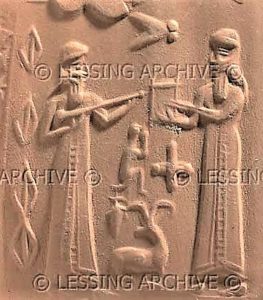 (Marduk & son Nabu the scribe)
(Marduk & son Nabu the scribe)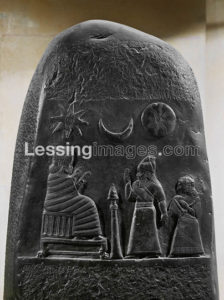 (Nanaya seated with Babylonian king before her)
(Nanaya seated with Babylonian king before her)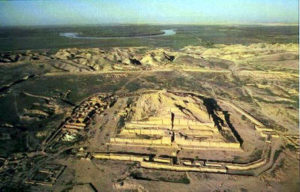
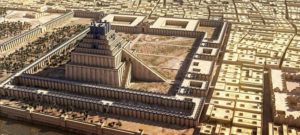 (Ezida, Marduk’s temple residence in Babylon)
(Ezida, Marduk’s temple residence in Babylon)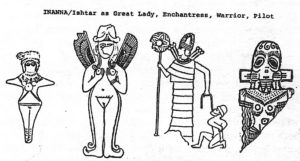 (Inanna, Goddess of Love & War)
(Inanna, Goddess of Love & War)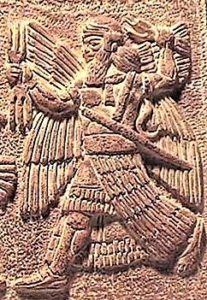
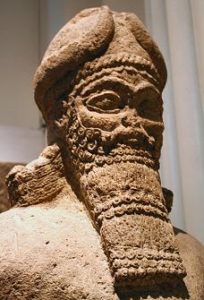
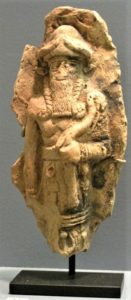
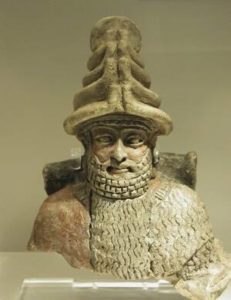
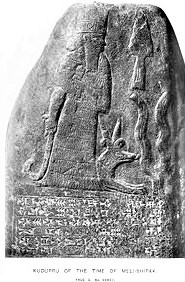
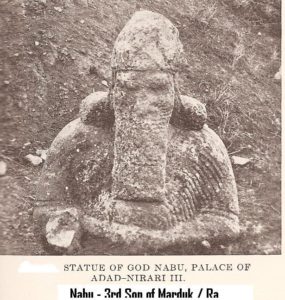
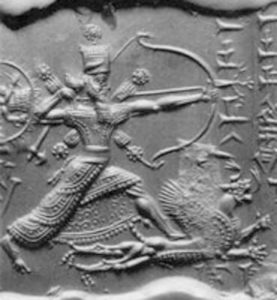
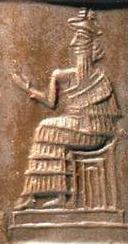
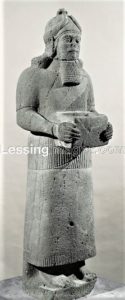
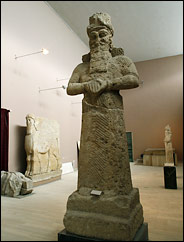
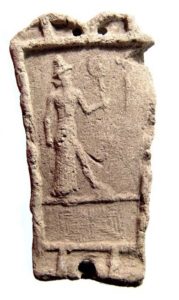
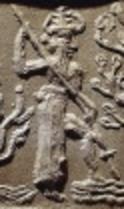
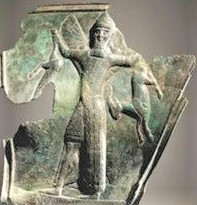
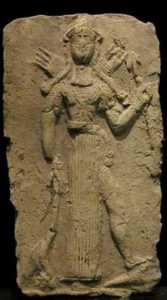
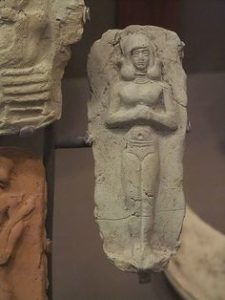
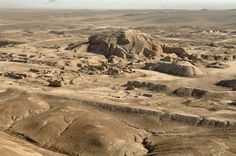
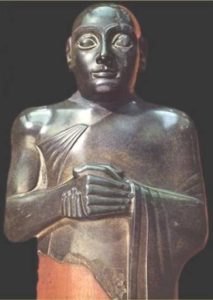
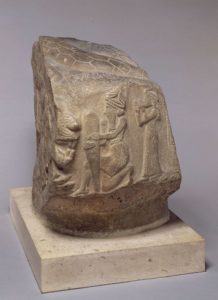
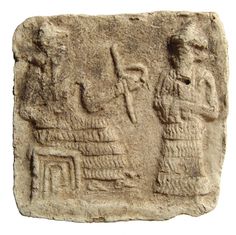
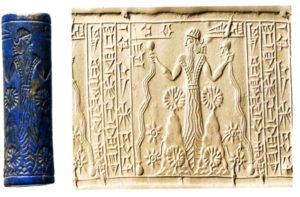
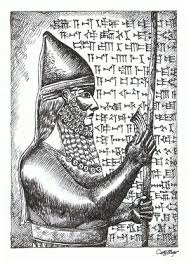
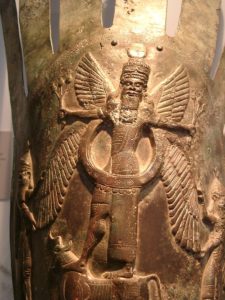
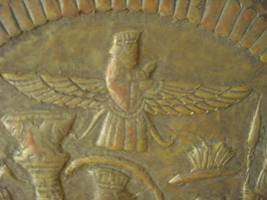
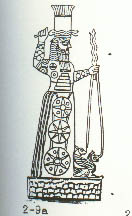
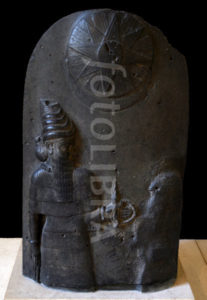
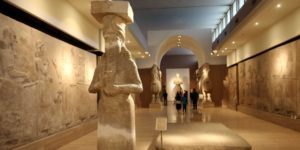
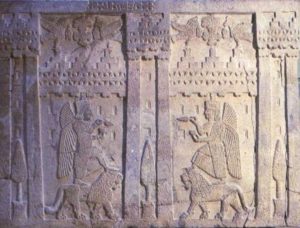
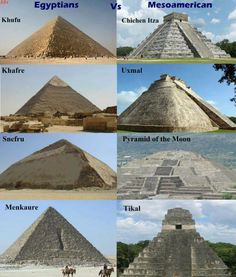
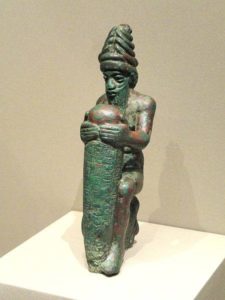
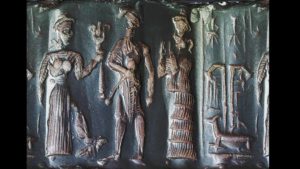
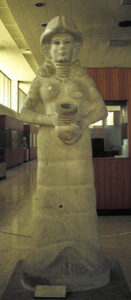
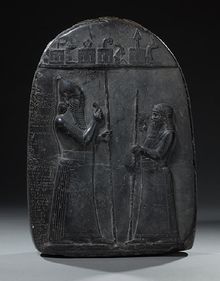
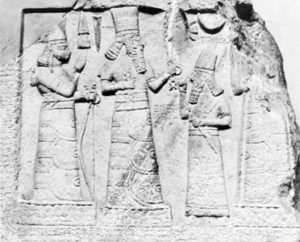
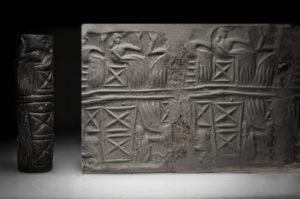
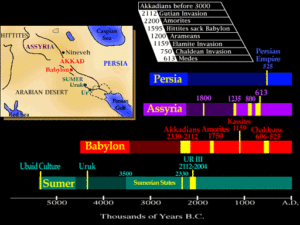
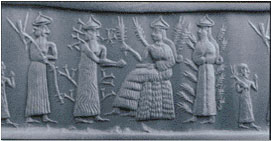
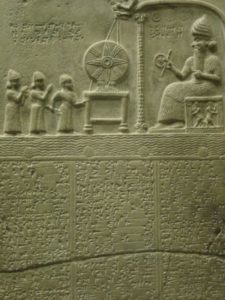

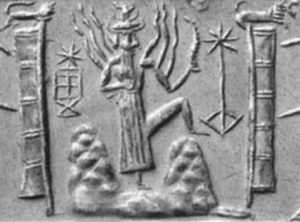
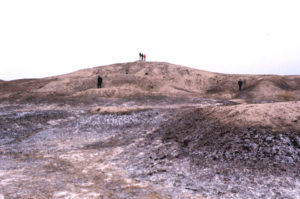
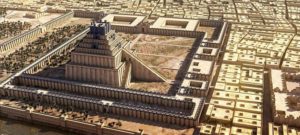
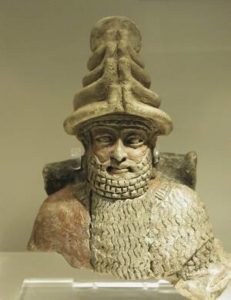
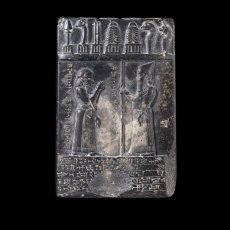

 (
( (
(


 (
(




 (
(




 (
(





 (
(

 (
(



